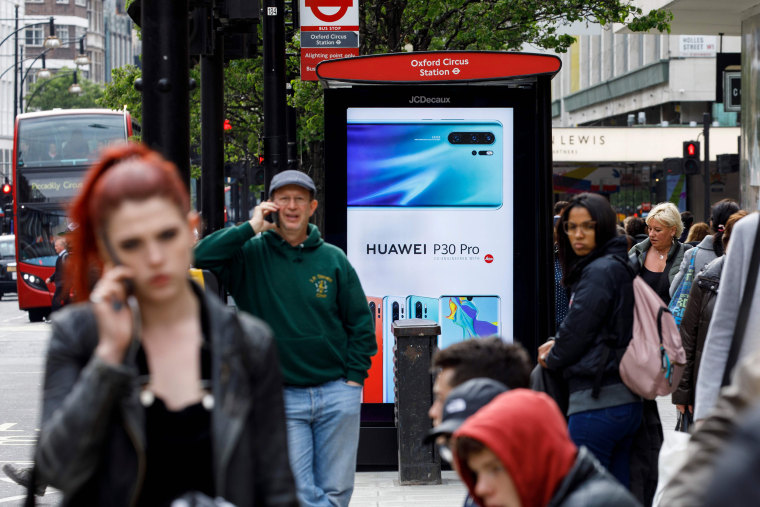LONDON — The United Kingdom has risked angering the United States and potentially jeopardized intelligence sharing between the two nations by announcing on Tuesday that it will allow Chinese telecoms giant Huawei to build parts of its 5G internet network.
However, the U.K. government said in a statement that the company will only have access to 35 percent of the network, excluding "core" elements of the country's telecoms infrastructure. The company will also be labelled a "high-risk vendor."
The U.K. government released a statement that doesn't name Huawei, but outlines "how to best mitigate the risks of high risk vendors in 5G and gigabit-capable networks" — a reference to the Chinese firm.
"The government has reviewed the supply chain for telecoms networks and concluded today it is necessary to have tight restrictions on the presence of high risk vendors," Digital Secretary Baroness Morgan is quoted as saying in the statement. "This is a U.K.-specific solution for U.K.-specific reasons and the decision deals with the challenges we face right now."
Victor Zhang, Huawei's vice-president, said in a tweet that the company was "reassured by the U.K. government’s confirmation that we can continue working with our customers to keep the 5G roll-out on track."
Ciaran Martin, CEO of the U.K.'s National Cyber Security Centre, said: "High risk vendors have never been — and never will be — in our most sensitive networks. Taken together these measures add up to a very strong framework for digital security."
The decision, the result of a long-running review, was made by Johnson after a meeting of the British National Security Council (NSC), comes after three senators warned the U.K. against any involvement with the company, which has been accused of posing a security risk.
A letter signed by John Cornyn, R-Texas, Marco Rubio, R-Florida, and Tom Cotton, R-Arkansas, explicitly warned that a post-Brexit free trade deal between the U.K. and U.S. could be threatened by Huawei's involvement in British infrastructure.
"This letter represents a genuine plea from one ally to another," they wrote in a letter dated Jan. 24. "We do not want to feed post-Brexit anxieties by threatening a potential U.S.-U.K. free trade agreement when it comes to Congress for approval. Nor would we want to have to review U.S.-U.K. intelligence sharing."
Secretary of State Mike Pompeo wrote on Sunday wrote on Twitter that the U.K. faced a "momentous decision" and agreed with British Conservative lawmaker Tom Tugendhat who has long warned against a Huawei deal.
Separately, Rep. Jim Banks (R-Ind) introduced a bill last week that would see the U.S. stop intelligence sharing with any nation that allowed Huawei access to their 5G telecoms infrastructure.
Washington has long considered Huawei a threat, fearing that its access to vast amounts of personal data could be used for espionage by the Chinese state. President Donald Trump signed an executive order last May effectively banning it from operating in the U.S.
American security officials came to London earlier this month to warn British counterparts of the risks of proceeding with Huawei, which has been working in the U.K.'s telecom systems since 2005.
5G, shorthand for fifth-generation telecom systems that improve on existing 4G connections, will allow internet-connected devices to operate much faster and communicate with other devices more efficiently, potentially opening up opportunities for more automation at home, in the workplace, in retail and in transportation.
Download the NBC News app for breaking news and politics
Huawei already provides all four of the U.K.’s cellular networks with limited 5G technology, but the company has not had access to core national infrastructure, where customers’ personal details are held.
The British have been reluctant to heed American warnings because of the huge cost of reversing work already begun with Huawei and the huge economic incentive of having a functional 5G network.
"Letting foreign equipment into the higher risk areas of the telecommunications network always carries with it some potential dangers," said Joe Hancock, partner at MDR Cyber, a division of London law firm Mishcon de Reya.
"Huawei could be a totally innocent provider but once the equipment is in place the risk that it could be misused will nevertheless exist."
The company is no stranger to international controversy. Canadian authorities arrested Huawei's chief financial officer, Meng Wanzhou, in 2018 at the request of U.S. officials who want to extradite and charge her with misleading banks about the company's business dealings in Iran.
Meng, 47, appeared in court in Vancouver last week as part of a series of hearings to determine whether her alleged crimes, which she denies, would be considered criminal in Canada. Meng is the daughter of Huawei's founder Ren Zhengfei.

